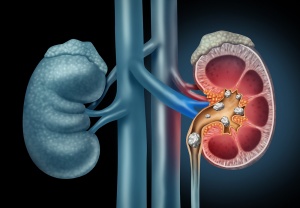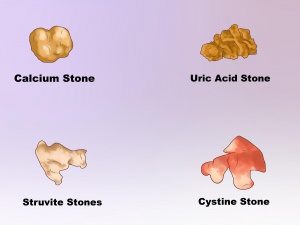Kidney Stone Specialist- Dr. Chintaman Chaudhari
Dr. Chintaman Chaudhari has been working as a Kidney Stone Specialist in Nashik. He has an experience of 20 years in this field. This Doctor possesses an impressive amount of knowledge and constantly keeps updated with advancements made in the field.Dr. Chintaman Chaudhari is also a Consultant Andrologist in Nashik.
What are kidney stones?
Kidney stones can be as small as a grain of sand or as large as a golf ball. Repeated stone attacks can affect the function of your kidneys.
The kidneys make urine by removing extra water and waste from your blood. They also help your body balance certain chemicals in your blood. Two narrow muscular tubes, called ureters, drain urine from each kidney into the bladder, which temporarily stores urine. The urethra is the tube that empties urine from the bladder and out of the body.
Urine contains chemicals (magnesium, citrate, pyrophosphate and various proteins) and enzymes that normally keep crystals from forming. In most cases, stones are caused by having too many salts in your urine. Salts can build up in the kidney when you don’t have enough urine or the levels of the salts are increased. When they build up to a certain point, the salts no longer dissolve. They form crystals instead.
There are different kinds of kidney stones :

- Calcium stones. Calcium, a normal part of a healthy diet used in bones and muscles, is normally flushed out with the rest of the urine. However, excess calcium not used by the body may combine with other waste products to form a stone.
- Struvite stones. Struvite stones, composed of magnesium, phosphate and ammonia, may occur after a urinary tract infection.
- Uric acid stones. Uric acid stones may form when urine is too acidic, as in certain conditions, like gout or malignancies.
- Cystine stones. Cystine stones consist of cystine, one of the building blocks that make up muscles, nerves and other parts of the body.
Small crystals can pass from your body through your urine without you ever knowing about them. But when the crystals grow larger and become stones, they can get stuck in the ureter and block the flow of urine. This causes infection and pain.
Symptoms of kidney stones
There are no true “warning signs” for kidney stones. Small stones are usually passed unnoticed. Large stones often remain undetected until they become lodged in the ureter and the person has severe and sudden pain in the back or lower abdomen. While people may experience them differently, here are the most common symptoms of bladder, kidney and ureteral stones:
- Extreme, sharp pain in the back or side that will not go away — changing positions does not help; pain can come and go.
- Blood in the urine.
- Nausea and vomiting.
- Cloudy or odorous urine.
- Frequent urination.
- A burning feeling when you urinate.
- Fever and chills.
Treatment for kidney stones
Changes in the way your body uses food and drink can increase your chances of growing crystals and, in turn, stones. Certain conditions make it more likely that you will get them:
- Gastrointestinal disease.
- Kidney disease.
- Urinary tract infections.
- Metabolic disorders (such as hyperparathyroidism).
- A family history of stone formation.
- An inherited condition that causes the body to absorb too much calcium.
- A low level of citrate in the urine, which may contribute to calcium stones.
- Gout.
- Bowel disease.
- High blood pressure.
The National Institute of Diabetes and Digestive and Kidney Diseases (NIDDK) says the best ways to prevent kidney stones are to:
- Drink more water. Up to 12 full glasses of water a day can help to flush away the substances that form stones in the kidneys. Ginger ale, lemon-lime sodas and fruit juices are acceptable.
- Limit caffeinated beverages. Keep coffee, tea and cola to one or two cups a day. The caffeine may cause a rapid loss of fluid.
- Limit sodium. Salt is another chemical that must leave the body through the urine, and the more chemicals that are in the urine, the more likely you are to form a stone.
- Modify your diet. After a careful analysis of the stone, your doctor may advise you to avoid specific foods, such as meat protein or foods high in calcium.
- Take medications. Certain medications can prevent calcium and uric acid stones from forming.
- Maintain a healthy weight. If you are overweight, losing weight may help.
The most important part of prevention is getting plenty of fluids. This dilutes the urine, which, in turn, triggers increased urination. More trips to the bathroom help remove excess chemicals from the urine and kidneys, lowering the chances of stone formation.
If you are suffering from such symptoms, please visit Dr. Chintaman Chaudhari- Kidney Stone Specialist in Nashik.
